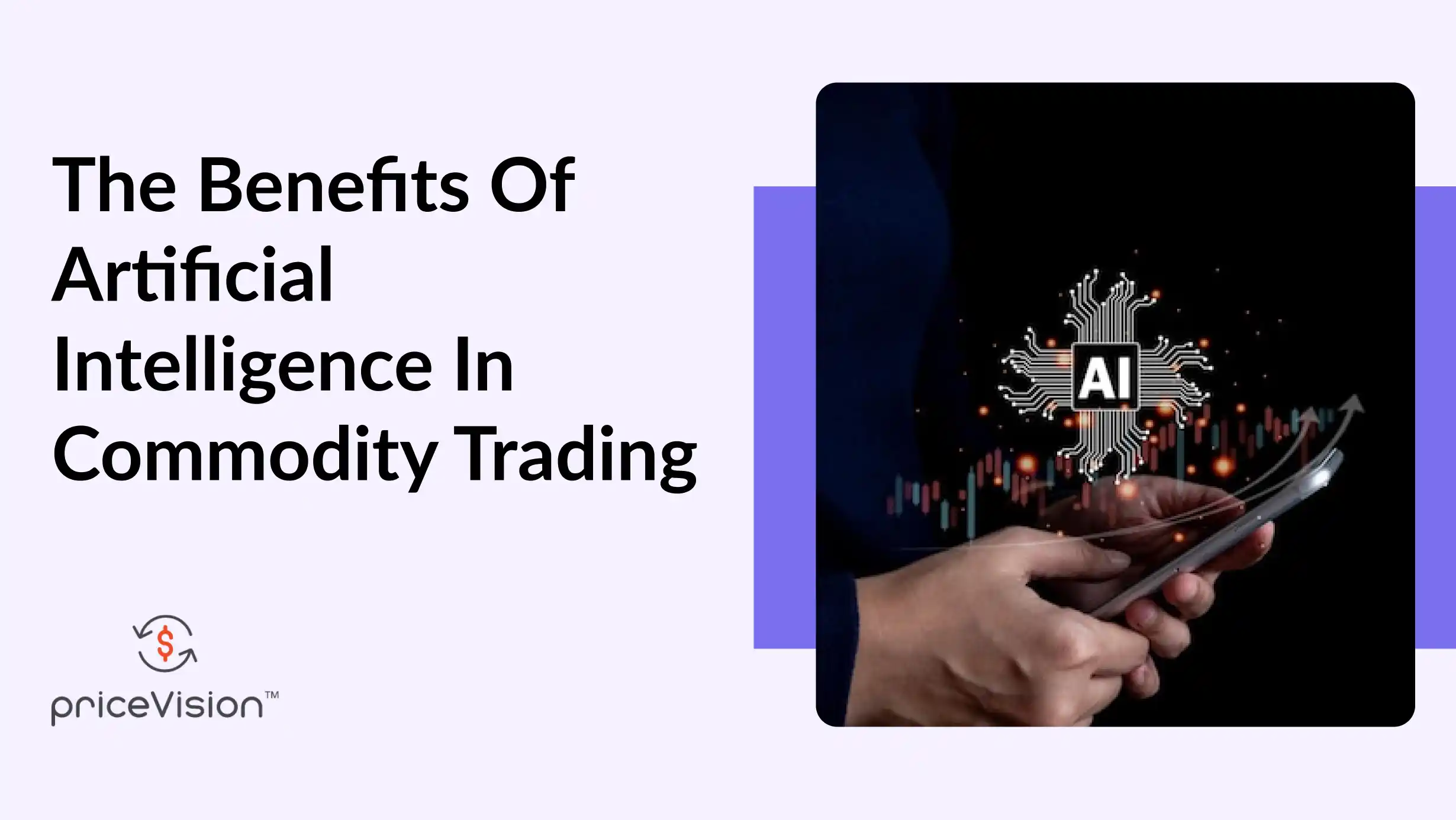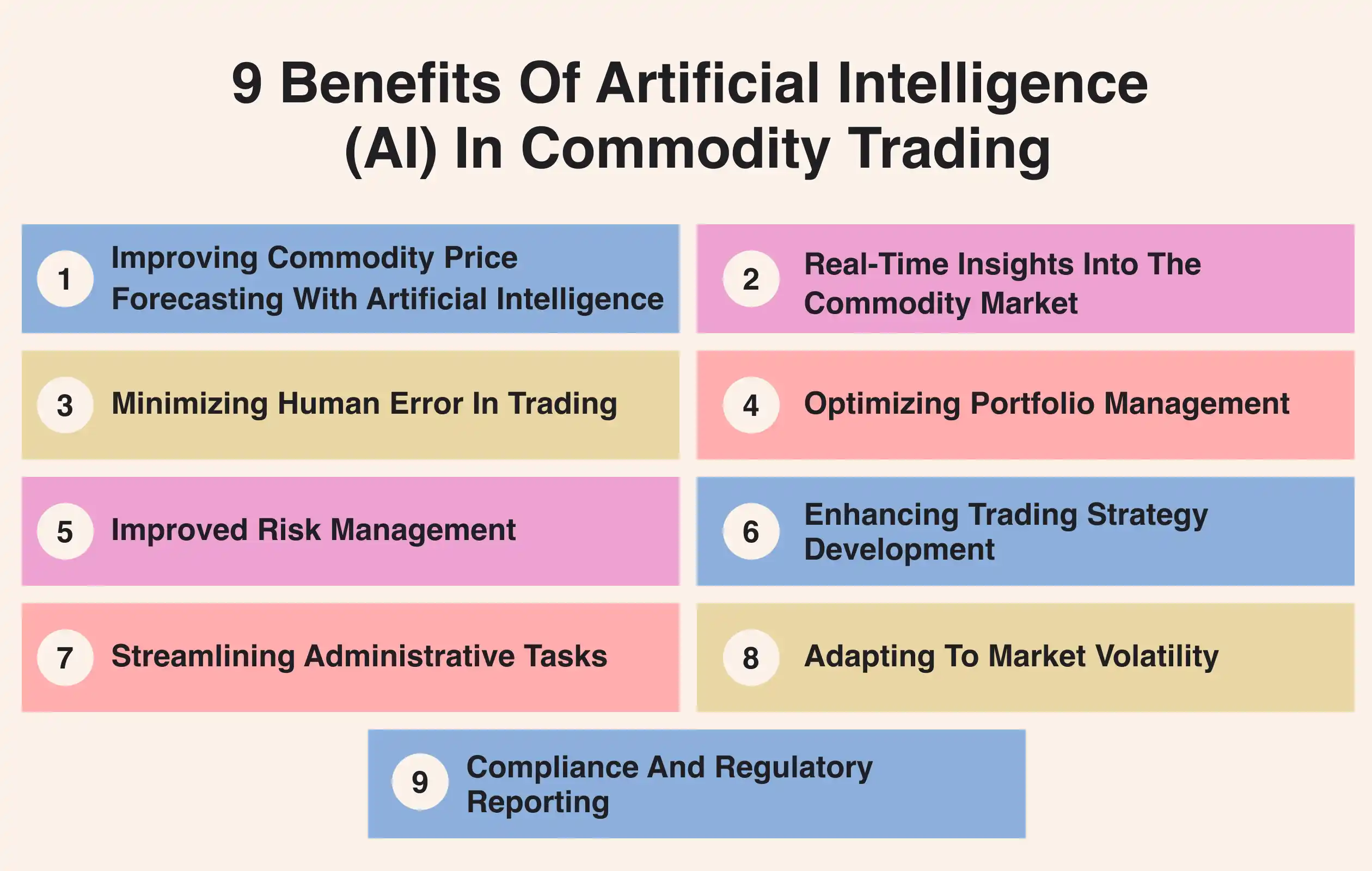The Benefits of Artificial Intelligence in Commodity Trading

Commodity trading plays a crucial role in the global economy.. It involves daily transactions of commodities like oil, gold, and crops. In the swift commodity market, staying updated is key. AI and ML are now crucial in this sector. They help handle the intricate aspects of trading. This blog discusses AI's advantages in commodity trading. It focuses on its use in predicting real-time commodity prices. Additionally, it examines AI's influence on the commodity market, enhancing decision-making and market analysis.
9 Benefits of Artificial Intelligence (AI) in Commodity Trading
Let’s explore the top nine ways AI is transforming commodity trading:

1. Improving Commodity Price Forecasting with Artificial Intelligence
Commodity trading is complex, with ever-changing commodity prices. Various factors affect it. These include weather's impact on agriculture and geopolitical events on oil. Supply and demand also play a very important role. Traders need accurate commodity price predictions in this environment.
Artificial Intelligence (AI) and Machine Learning (ML) are key options. They process large datasets well. These include historical commodity prices, weather, and news sentiment. AI and ML find patterns that humans might miss. This helps in understanding market trends.
AI and ML adapt and learn from new data. This improves their predictions over time. They process data quickly, helping traders respond to market changes. They also find links between different factors. This gives a deeper market understanding.
These insights help traders predict market moves. They can make timely decisions. Accurate forecasts are essential for managing risk and maximizing profits. In commodity trading, AI and ML are vital. They change how decisions are made in a constantly fluctuating market.
2. Real-time Insights into the Commodity Market
The commodity market changes quickly and needs constant attention. Artificial intelligence (AI) has greatly improved how we track these changes. It works non-stop, tracking the ever-changing commodity market live prices. AI's advanced tools let us monitor and analyze prices in real time. This gives traders the latest, most accurate information.
This progress helps traders react fast to market shifts. They stay ready and make decisions quickly. Traders can spot new trends quickly and trade at the best times. This agility gives them an edge in the fast-moving commodity market.
To sum up, using AI to track and analyze commodity market live prices makes traders more efficient and effective. They can understand and act in the market more quickly and accurately.
3. Minimizing Human Error in Trading
Human commodity traders may make errors due to fatigue, emotions, and biases. These errors can negatively affect financial transactions. On the other hand, AI-driven commodity trading systems use specific algorithms and detailed data analysis. This approach avoids the weaknesses inherent in human traders. AI in commodity trading leads to more consistent and logical decision-making. This reduces risks linked to human errors.
AI commodity trading systems also remove emotional influences from commodity trading decisions. Emotions often cause hasty and poor choices. AI's adherence to set algorithms promotes disciplined, systematic commodity trading. This lowers the chance of expensive errors. It leads to a more stable and effective investment scenario.
In summary, AI in commodity trading harnesses advanced technology for strategic benefits. It lessens the effects of human limitations. The outcome is a stronger, more dependable trading framework. It matches the precision and consistency needed in fast-paced financial markets.
4. Optimizing Portfolio Management
Commodity traders handle diverse portfolios with many types of goods. They need advanced tools for effective management. Artificial Intelligence (AI) is key in enhancing portfolio management. It provides insights based on data analysis. AI uses complex algorithms. These algorithms suggest ways to diversify portfolios. They also offer strong risk management methods. AI automatically adjusts portfolios based on set rules. This technology helps traders manage investments more efficiently. It improves overall performance. It also allows smarter use of resources.
AI's ability to analyze data is valuable. It helps traders see market patterns and trends. These may be missed by traditional methods. This leads to better decision-making. It reduces risks and takes advantage of new opportunities. AI-driven portfolio management increases accuracy. It also helps traders adjust to changing markets. The blend of commodity trading and AI strengthens decision-making. It also increases the chances of higher returns in a competitive market.
5. Improved Risk Management
Risk is inherent in commodity trading, but AI can help mitigate it. AI algorithms assess the risk associated with different commodities and trading strategies. They provide risk management recommendations, such as setting stop-loss orders or adjusting position sizes. By implementing these AI-driven risk management strategies, traders can protect their investments and minimize losses.
6. Enhancing Trading Strategy Development
AI helps traders in strategy development. It examines past data, spotting patterns and trends. This helps formulate strategies likely to succeed. AI also backtests these strategies. It assesses their effectiveness in different market scenarios. This ensures strategies are strong and dependable, enhancing trading success. AI's analysis and testing elevate trading efficiency and reliability.
7. Streamlining Administrative Tasks
Commodity trading involves administrative tasks like data entry, trade confirmation, and reporting. AI-powered systems can automate these processes, reducing the workload for traders and ensuring accuracy. This allows traders to focus more on strategic decision-making and less on routine administrative tasks.
8. Adapting to Market Volatility
The commodity market can be highly volatile, and sudden price swings can catch traders off guard. AI excels at adapting to such market conditions. It can identify volatility patterns and adjust trading strategies accordingly. This adaptability helps traders navigate turbulent market environments with greater confidence.
9. Compliance and Regulatory Reporting
Commodity trading is subject to regulations and reporting requirements. AI systems can assist in ensuring compliance by monitoring trades, flagging potential violations, and generating required reports automatically. This reduces the risk of regulatory fines and penalties for traders and firms.
Winding Up
Artificial Intelligence (AI) has revolutionized commodity trading. It offers traders advanced data analysis tools. These tools help make well-informed decisions. They also assist in managing risks efficiently. AI improves price prediction accuracy. It gives real-time market insights. AI simplifies routine administrative tasks. This aids traders in staying ahead in the competitive market. They can thus optimize their profit potential. AI's influence in this field is growing steadily. Its future impact promises even greater advantages for traders. In the current fast-moving market scenario, adopting AI is essential, not optional.